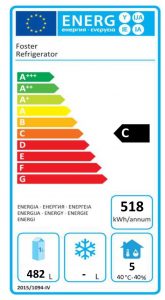
The coronavirus pandemic has sent shockwaves through Britain's economy - with hundreds of thousands of businesses brought to the brink of closure as a result of the uncertainty of the last six months.
But those shockwaves could pale in comparison to the impact of Brexit, the UK's upcoming exit from the European Union.
Come January, particularly if the government and the EU fail to strike a deal, we could see a very different landscape from further potential business closures and job losses to endless truck queues at our borders.
What's more, what this might mean for the refrigeration industry is still hard to say, although we do know that there will be a few changes to contend with. Rest assured though, the industry has been busy preparing and putting measures in place to ensure that customers will feel minimum impact.
Let's take a look, beginning with European regulations of equipment.
What it Says on the Box
Leaving the European Union means that products in the UK will no longer have to conform to the same standards as products in the rest of Europe. This means that we know for certain that the look of these labels will be changing when January comes around.
Most notably:
After CE will come the UKCA
The CE mark is a familiar sight on appliance packaging. Currently, it promises that that appliance conforms with the health, safety and environmental protections which apply within the European Economic Area - which we will be leaving.
From the first of January, products will have to conform instead with the UK's regulations, and carry the UKCA mark to prove it.
But while the labels will be different, will the products actually change? As it stands, it seems not: the UK's regulations will remain much the same as they have been under the EU - only the logo will actually change, for now.
A similarly superficial shift seems set to change energy efficiency labelling:
No more ENERG
ENERG labels, also known as MEPS (Minimum Energy Performance Standard) are also a familiar sight on appliance boxes.
They currently show us, with colour-and-letter-coded ratings from dark green (or A+++) for highly efficient appliances to bright red (or G) for appliances with very low efficiency, which machines work best to protect the environment.
As the UK leaves the EU, the EU's energy efficiency standards will no longer apply but, again, the same standards and similar labelling are likely to take their place. Initial changes may just just include the Union flag instead of the European Union's flag and with the labels written only in English.
But, just as with the CE to UKCA shift, the UK's energy efficiency standards may begin to change in the long term: while some are afraid the UK will begin accepting less efficient appliances when outside the EU, others have suggested that the UK will in fact impose more stringent efficiency standards to ensure we meet the environmental goals we laid out for ourselves in the 2016 Paris climate accords.
Again, it seems we'll have to wait and see how all the details turns out.
New labels and status-quo regulations aren't all there is to Brexit, however. The disruption, which is likely to come with the new year, has caused many companies to look to the future trading market.
Take Stock and Stock Pile
 Come January, there will definitely be some disruption to imports and exports at our borders - and that disruption will be even more dramatic if we end up leaving the EU with no fixed trade deal.
Come January, there will definitely be some disruption to imports and exports at our borders - and that disruption will be even more dramatic if we end up leaving the EU with no fixed trade deal.
A no-deal exit could cause trading links between British and European businesses to fall apart under the strain of ramped-up border checks and any immediate changes made to certification standards.
Fortunately, many of the brands affected - those who are reliant on European manufacturers for imported parts or products - have been looking for alternative options since the Brexit vote was first counted in 2016.
For many of those brands with the warehouse space available, this has meant buying in bulk and storing large quantities of stock in this country - preparing for the disruption which will more than likely come in 2021.
With stockpiles of fully-functioning appliances as well as essential construction materials, components and spare parts, these companies hope to reduce the impact of Brexit on both the manufacturing process and on the customer - while ensuring that regular servicing and repairs can still take place through the next year.
But these are only temporary fixes which aim to help these refrigeration manufacturers weather the turbulence of the first few weeks and months of Brexit. Eventually those stockpiles will run out.
And preparing for that run-out date is tricky - particularly as we still don't know much about the UK's future trading relationships with other countries, both inside and out of Europe.
A few brands have managed to begin trying to find ways to get the equipment and parts they need from other markets - by building trade links with countries outside the EU - but, for most, there will still be a lot of networking work to do from 2021 onwards.
And now we come to you:
What about the customers?
All of this stockpiling preparation has aimed to make sure that customers don't feel the brunt of Brexit - to keep appliances and equipment streaming through from European factories and into your businesses and to ensure that any necessary servicing and repairs can continue as normal in the new year.
But even with the best preparation, the problems posed by changes to shipping regulations and the drastic increase in paperwork caused by hard borders will likely mean many of us will face delays to delivery times. Even the most forward thinking of manufacturers will struggle to get everything exactly right.
In these tough times, the best thing for all of us to do - whether we're customers, manufacturers or distributors - is to get coordinated, to ensure that everyone has access to the equipment they need when they need it.
As the biggest manufacturer of refrigeration appliances, Foster refrigeration, has recommended, that if you're worried about getting your fridge or freezer on time, get in touch with your appliance supplier and share your forecast requirements. To help alleviate waiting times, Foster hold a good range of product and offer an 24hr SOS delivery for stocked items to speed up delivery.
And remember, whatever headaches January brings, FFD Commercial Refrigeration will still be here to help you keep your cool.







Leave a Comment
Your email address will not be published. Required fields are marked *